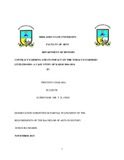Please use this identifier to cite or link to this item:
https://cris.library.msu.ac.zw//handle/11408/2283| Title: | Contract farming and its impact on the tobacco farmers’ livelihoods: A case study of Karoi 2004-2014. | Authors: | Chakara, Precious | Keywords: | Contract farming Tobacco farming Poverty alleviation |
Issue Date: | Nov-2015 | Publisher: | Midlands State University | Abstract: | The research sought to establish challenges associated with the achievement of automaticityat grade two level with the view to find possible strategies to circumvent the established challenges, consequently enhancing reading and school performance. The study was necessitated by the fact that eleven subjects out of twelve in the Zimbabwean Primary School Curriculum are done in English, for this reason the achievement of automaticity was considered paramount. The study was also necessitated by the outcry of grade three to seven teachers in Vutika Cluster on the alarming number of non-readers in schools. More often than not research on the achievement of automaticity has focused on developed countries and urban settings leaving rural learners’ needs seemingly unexplored. The prevalence of non-readersindeveloped countries left the researcher with wonder as to the state of affairs in rural settings. Literature revealed that non-readers are prevalent across the world whether the country is poor or rich. Reviewed literature also revealed that learners have diverse challenges in their quest to achieve automaticity in English reading. Some strategies need to be identified to make the challenges surmountable. The research study employed the mixed methods approach and a descriptive survey design. The population comprised of one hundred and ninety grade two learners, eight grade two teachers and three teachers-in-charge in Vutika Cluster. In terms of learners 25% (49 learners) constituted the sample. Teachers and teachers-in-charge were chosen using purposive sampling. Eight grade two teachers and three teachers-in-charge voluntarily participated in the research. Data were collected using three research instruments namely a questionnaire for teachers, an interview guide for teachers-in-charge and a sample of learners’ scores which were averaged. Data were analyzed using both qualitative and quantitative data analysis techniques. The study found that non-readers were in the range 20% to 30% in the schools. The study concluded that non-readers are really a reality in schools. The research study established nineteen challenges that are associated with achievement of automaticity at grade two level. It was therefore concluded that grade two learners face challenges in striving to achieve automaticity. The research established twelve strategies that may be employed in helping learners achieve automaticity in English reading. It was therefore concluded that the reading challenges can be surmountable. The study recommended that: • Teachers need to invent ways of dealing with large classes which are a reality in Vutika Cluster. • Teachers ought to treat learners equally and expect positive from them since they possess the language acquisition device (LAD). • Teachers need to recommend for Basic Education Assistance Module learners from impoverished environments. • Teachers need to devise and implement compensatory programs to cover learners from poverty-stricken homes. • Teachers need to assign homework to maximize reading practice. • Teachers ought to create a conducive reading environment and culture • Teachers and teachers-in-charge need to conscientise parents on their roles regarding achievement of automaticity so that they actively contribute to their learners’ achievement. • Teachers-in-charge need to run staff development sessions on how learners can be best assisted to achieve automaticity. | URI: | http://hdl.handle.net/11408/2283 |
| Appears in Collections: | Bachelor Of Arts In History Honours Degree |
Files in This Item:
| File | Description | Size | Format | |
|---|---|---|---|---|
| CHAKARA.pdf | Full text | 1.19 MB | Adobe PDF |  View/Open |
Page view(s)
140
checked on Nov 8, 2025
Download(s)
92
checked on Nov 8, 2025
Google ScholarTM
Check
Items in MSUIR are protected by copyright, with all rights reserved, unless otherwise indicated.



